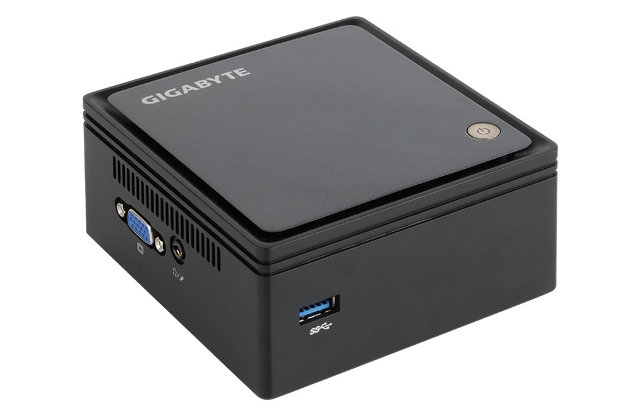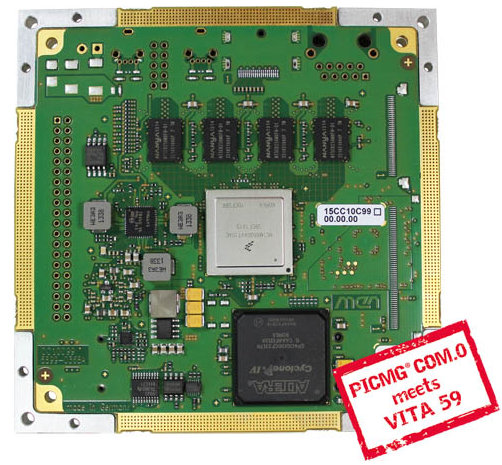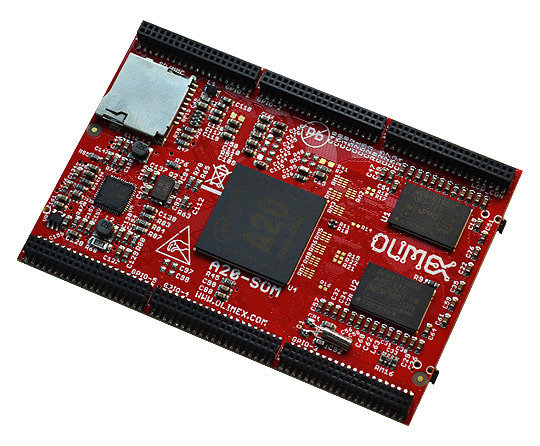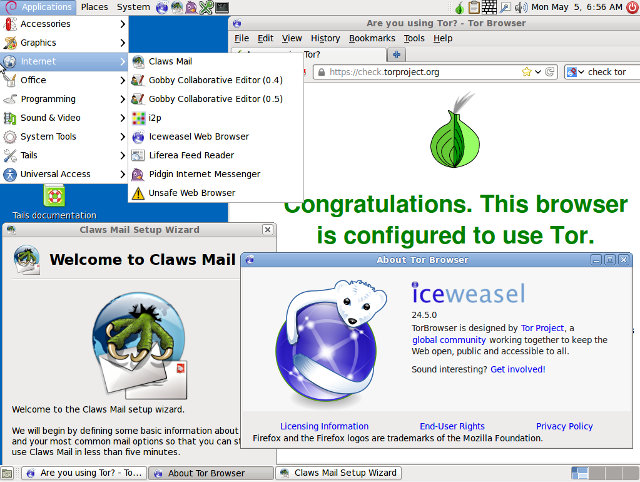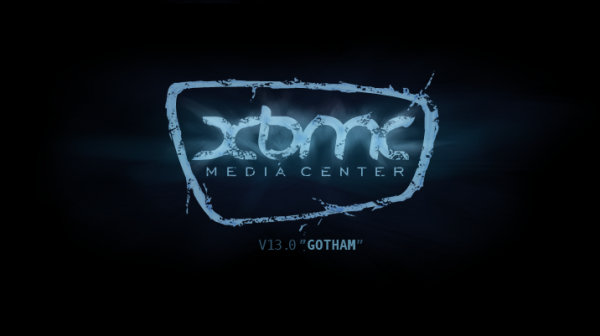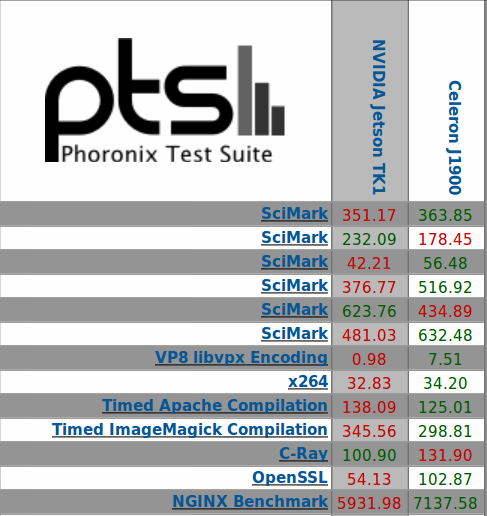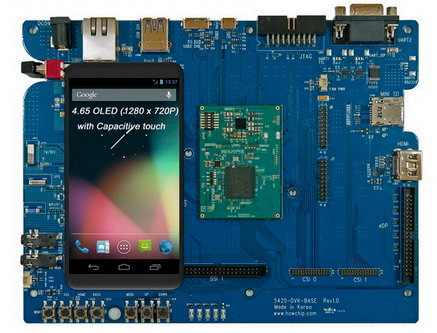A new BRIX system / Ultra compact PC kit has shown up on GIGABYTE website. GB-BXBT-2807 is powered by Intel Celeron N2807 which, with 4.3W TDP, is one of the most energy efficient Bay Trail processor, supports up to 8GB RAM, 2.5″ SATA drives, and comes with both HDMI and VGA output. GIGABYTE GB-BXBT-2807 specifications: SoC – Intel Celeron N2807 dual core processor at 1.58 GHz (Burst: 2.17GHz) with Intel HD graphics. 4.3W TDP System Memory – 1x SO-DIMM DDR3L 1.35V slot @ 1333MHz up to 8GB Storage -2.5″ SATA HDD (7.5/9mm thickness) Video Output VGA – Up to 2560 x 1600 @ 60Hz HDMI – Up to 1920 x 1600 @ 60Hz (HDMI 1.4a) Audio – HDMI, headphone/microphone jack, Realtek ALC283 codec. Connectivity – Gigabit LAN (Realtek RTL8111G), Wi-Fi 802.11b/g/n and Bluetooth 4.0 (AW-NB159H module) USB – 1x USB 3.0, 2x USB 2.0 ports Expansion Slot – 1 x […]
ARM Based COM Express Modules by MEN Mikro Electronik and Pactron
A few days ago, in a post listing different system-on-module (SoM) standards, I mentioned COM Express standard was targeting SoMs based on x86 processors, and SMARC was the equivalent for ARM. I still understand it’s the case as COM Express standard defines mechanical dimensions that are usually larger than SoM standard for low power processors, some buses found in ARM and x86 are different (e.g. AFAIK LPC and PCI are not found in ARM SoC), and the standard supports high power signals which are not needed in ARM or MIPS processors. Having said that, I’ve been pointed out to two ARM based COM Express modules, which could make sense if you want to use an ARM based module using existing COM Express compatible baseboards. The COM Express modules below feature Freescale i.MX6 and Marvell Armada XP SoCs, and have been designed respectively by MEN Mikro Electronik and Pactron. MEN Mikro […]
Olimex Introduces Low Cost AllWinner A13, AllWinner A20 and TI Sitara AM3352 Systems-on-Module
About a year ago, Olimex reported working on an AllWinner A20 System-on-Module. But after some unexpected delays, Olimex A20-SOM is finally available, and they’ve even announced A13-SOM and AM3352-SOM, respectively based on AllWinner A13 and Texas Instruments Sitara AM3352 ARM Cortex A8 SoCs, with price starting at 12 Euros for 1K orders. Olimex A20-SOM and A20-SOM-4G There are actuall two versions of the SoM, A20-SOM-4G including 4GB NAND flash, and A20-SOM without. Here are the specifications: SoC – AllWinner A20 dual core ARM Cortex A7 processor with Mali-400MP2 GPU System Memory – 1GB DDR3 memory Storage – 4GB NAND Flash (A20-SOM-4G only) + microSD slot Debugging – UART console connector (at the back) PMIC – AllWinner AXP209 PMU IC Misc – Status LEDs, RESET, RECOVERY buttons Connectors – 6x 2×20 pin 0.05″ female headers Dimensions – N/A The SoM is said to support Android and Debian, but you could also […]
A Quick Test Drive of Tails, a Privacy Focused Linux Distribution
Tails (The Amnesic Incognito Live System) is a Linux distribution that allows you to use the Internet anonymously and circumvent censorship via the Tor network. It leaves no trace, and is said to use “state-of-the-art” cryptographic tools to encrypt files, emails and instant messages. It’s distributed as a live image that boots from a DVD drive, a USB stick, or an SD card. Tails v1.0 has recently been released. so let’s give it a quick try. Tails is currently only available for x86 (32-bit), no ARM image yet. The source code is available via a git repo. Let’s download the ISO image (mirror), and signature. Alternatively you can download both via BitTorrent. To make sure the image is not compromised it’s recommend to verify the integrity of the ISO image with the signature we’ve just downloaded. You’ll also need a signing key The are several methods, but I’ve opened a terminal, […]
XBMC 13 “Gotham” Released
After month of development, alpha releases, beta releases, RC releases, XBMC 13 “Gotham” is finally out. This is the first official release that supports hardware video decoding for ARM and x86 based Android 4.0+ devices. Support is not available for 100% of devices, as for instance, AllWinner A1X/A20 and Amlogic SoCs do not support the standard Android StrageFright or MediaCodec APIs, but most others should. There’s one XBMC Android version for ARM, one for x86. Android hardware video decoding is obviously not the only feature or improvement brought about by XBMC 13. Here are the key ones: Raspberry Pi and Android speed improvements – Overall system performance improvements, but optimizations are said to be particularly noticeable when opening and browsing libraries, loading images and starting videos. Stereoscopic 3D Rendering – SBS, TAB, anaglyph, and interlaced are supported. XBMC cannot yet support 3D blurays and cannot provide hardware acceleration for FullSBS/TAB […]
Nvidia Tegra K1 CPU/FPU Performance is Comparable to Intel Celeron “Bay Trail-D” J1900 SoC
Nvidia Jetson TK1 development board powered by Nvidia Tegra K1 quad core ARM Cortex A15 processor and a 192-core Kepler GPU has started shipping, and some people have already received theirs, including Michael Larabel (Phoronix) who ran some benchmarks on the board that comes pre-loaded with Ubuntu 14.04 LTS. We already had some benchmarks comparing Tegra K1 to ARM peers on Android, but it’s the first time Linux benchmarks are available. The benchmarks seems to only involve CPU and FPU, and probably not the GPU at this point, but the results are still interesting, and Michael also pointed links comparing Nvidia Tegra K1 development board performance to some Intel Core i5 based PCs, as well as a platform based on an Intel Celeron J1900, a quad core processor part of Bay Trail Desktop family. The later is most interesting as we compare systems with similar power requirements. Nvidia Tegra K1 […]
HOWCHIP 5420-DVK is a Mobile Development Kit with Samsung Exynos 5420 SoC, an OLED Display
With Arndale Octa already shipping, and the upcoming ODROID-XU2, we already have two low cost boards with Samsung Exynos 5420 big.LITTLE processor for less than $200. But if you want a more complete kit, HOWCHIP 5420-DVK with a 4.65″ OLED display and capacitive touchscreen, 2GB RAM, 4GB eMMC, and various connectors, could be an option. There’s also a Lite version without the OLED display. The board is composed of a CPU module, a baseboard, and a phone like display. Here are the specifications: SoC – Samsung Exynos 5420 Octa with 4x ARM Cortex A15, and 4x ARM Cortex A7 in big.LITTLE configuration, with Mali-T628 GPU. System Memory – 2GB LPDDR3 (POP with CPU) Storage – 4GB eMMC 4GB on board, SD card Slot Video Output HDMI type A connector MIPI DSI header up to 1980×1080 eDP (Embedded Display Port) header up to 2560×1600 Display – 4.65″ OLED (1280×720) with touch […]
How to Mount Google Drive in Linux with google-drive-ocamlfuse
Ubuntu One is not included in the latest Ubuntu 14.04 LTS, and will be phased out on the 1st of July 2014, with files from users being completely wiped out by the 31st of July. I liked the service to exchange files between my Ubuntu computer and Android phones, and features like automatic upload of pictures. Luckily there are alternative such as Dropbox, Copy.com, and ownCloud, each with their own pros and cons. But today, I’ll show how to easily use your Google Drive in Ubuntu / Debian. Last year, I wrote about insync, a beta service that offers Google drive integration into Linux, but since service went out of beta, the company started to charge $15 per account for consumers (one time year), with business plans starting at $15 per year. If you are interested in this solution you can still give it a try for free for 14 […]


